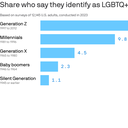Almost a quarter of Gen Z adults identify as LGBTQ+

7.6% of adults in the U.S. now identify as lesbian, gay, bisexual, transgender or another sexual orientation besides heterosexual, according to a Gallup survey released Wednesday.
Why it matters: That's a new record for adults who identify as LGBTQ+, a community that's grown by over four percentage points since 2012.
What's inside: The survey found that women are nearly twice as likely as men to identify as LGBTQ+.
- Bisexuality is the most common form of LGBTQ+ identification among women, while gay and bisexual are the most common among men.
- Generation Z (those born between 1997 and 2012) was by far more likely to identify as LGBTQ+ than any other generation.
Of note: Almost three in 10 (28.5%) Gen Z women identify as LGBTQ+.
- For comparison, 12.4% of millennial women and 4.7% of Generation X women identify as non-heterosexual.
- Over one in 10 (10.6%) Gen Z men identify as LGBTQ+, roughly double the percentage among millennial men (5.4%).
By the numbers: Almost a quarter (22.3%) of Gen Z identify as something other than heterosexual, which is an increase of 1.5 percentage points from last year's survey.
- 15% of all Gen Z adults, or more than two-thirds of those identifying as LGBTQ+, are bisexual, according to the survey.
The big picture: The growth of the LGBTQ+ community has coincided with an heightened acceptance of non-heterosexual orientations but also increased institutional bias against those within the community.
- Several states in recent years have passed or pursued legislation that would disproportionately restrict those who identify as LGBTQ+, especially those who are transgender.
Methodology: This Gallup survey is based on telephone interviews conducted in 2023 with 12,145 adults, aged 18 and older living in the U.S.
Results based on the total national sample have a margin of error of ±1 percentage point at the 95% confidence level, while those based on the total sample of 691 LGBTQ+ adults, the margin of sampling error is ±4 percentage points at the 95% confidence level.